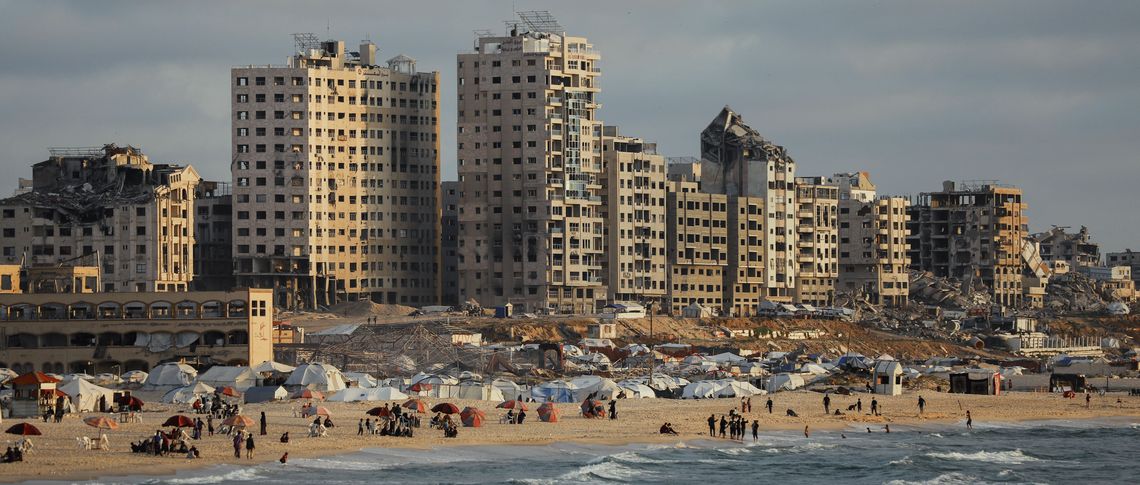Israel’s current offensive in the Gaza Strip has been underway since 18 May. With ‘Gideon’s Chariot’, the army is supposed to finally defeat Hamas, free the hostages and ensure that the Gaza Strip no longer poses a threat to Israel. To achieve this, Prime Minister Benjamin Netanyahu wants to reoccupy the coastal area in the long term and place it under Israel’s security control, disarm Hamas, banish its leadership and implement US President Donald Trump’s plan: the forced resettlement of the Palestinians. The indigenous population is initially to be crammed into a ‘sterile zone’ in the south of the coastal region covering around ten per cent of the area - ultimately with the aim of ‘voluntary’ emigration. But given the destruction of people’s livelihoods, there can be no question of voluntary emigration.
In early February 2025, Trump made forced displacement, a war crime, acceptable when he presented his vision for the Gaza Strip. The coastal area was to be developed into a ‘Riviera of the Middle East’, with the local population being permanently resettled in countries such as Egypt and Jordan — in the meantime, Sudan, Somaliland, Somalia and Libya were also being discussed. He thus undermined the further implementation of the agreement on a ceasefire and an exchange of hostages and prisoners, for which he himself had thrown his political capital into the balance before taking office. This could have been the starting point for a lasting ceasefire and a return to diplomacy. Even if Trump’s proposal was merely intended to put pressure on the Arab states to take on more responsibility: It legitimised the Israeli government’s zero-sum approach and revived old positions of the Zionist right, now repackaged as supposedly unconventional thinking.
In future, food and essential supplies are to be distributed directly to the population at a small number of distribution points – four centres are initially planned – in southern Gaza.
In any case, since the massacres of 7 October 2023, calls for a new Nakba (meaning the flight and expulsion of the Palestinian population from the territory of Israel in 1948) and for Israeli resettlement of the coastal area had gained momentum in the country’s national-religious spectrum. Trump’s initiative reinforced Netanyahu’s intransigence, who had no interest in entering phase 2 of the ceasefire agreement for domestic political reasons and henceforth described Trump’s vision as the ‘only viable option’. At the end of March, a migration department was set up in the Israeli Ministry of Defence to organise the ‘voluntary’ emigration of the Palestinian population of the Gaza Strip.
At the beginning of March, Israel imposed a complete closure on the war-torn Gaza Strip and no longer allowed any aid, water or electricity to be delivered so as to put pressure on Hamas. Since then, the humanitarian situation there has worsened dramatically. The progress made in supplying the population during the ceasefire has been cancelled out. The population is suffering from a massive lack of supplies. There is a threat of famine. Hunger among the civilian population is also a war crime.
In the coming days, Israel intends to reorganise the humanitarian aid system in the Gaza Strip. The government is justifying the move with the accusation that Hamas has intercepted aid deliveries to date and financed itself from them — no substantiated evidence of this has been presented to date. The United Nations and other aid organisations have also not confirmed this claim. In future, food and essential supplies are to be distributed directly to the population at a small number of distribution points – four centres are initially planned – in southern Gaza. The distribution is to be carried out by specialised NGOs, accompanied by private security service providers. The Israeli army is responsible for protecting the zones.
Humanitarian aid threatens to become an instrument of Israeli war aims.
The amount of relief supplies will, however, be limited to the absolute minimum required for survival, with the number of calories per person falling well below the minimum humanitarian standard. The population in the north would have no way of reaching the distribution centres. And aid recipients in the south would also be exposed to great danger to get to the distribution centres. In addition, the Israeli army would in future not only control the entry of aid supplies into Gaza, as is currently the case, but also the population’s access to humanitarian aid.
Neither the financing of the project nor key logistical issues have yet been clarified, for instance how a head of family is supposed to transport two weeks’ worth of food rations from a distribution centre to their own accommodation. Who will care for war orphans, the elderly and the wounded? Last but not least, unlike the UN organisations and experienced NGOs, the Gaza Humanitarian Foundation (GHF), which was set up for this purpose, has neither experience on the ground nor relationships with the local population. Under these conditions, it will hardly be possible to provide adequate and needs-based care.
Instead, humanitarian aid threatens to become an instrument of Israeli war aims. The new approach thus contradicts the basic humanitarian principles of impartiality, neutrality and independence. The United Nations and the aid organisations involved to date therefore firmly reject it. The GHF already appears to be on the brink of failure.
An immediate ban on the supply of weapons that could be used in the Gaza Strip or the West Bank and support for a revision of the EU-Israel Association Agreement would send a clear political signal. Together with European and Middle Eastern partners, the German government should also actively advocate a lasting conflict settlement in the Middle East in accordance with international law. The conference planned by France and Saudi Arabia for June to support a two-state solution offers the opportunity to develop a concrete roadmap out of the spiral of violence. It will also be important not only to support the Arab reconstruction plan for Gaza rhetorically, but also to work out in concrete terms how its political implementation can succeed. Not least for this reason, Germany should play a constructive role in this endeavour.
This article is an updated version of the article ‘A war crime before the eyes of the world’, which was published by Focus+ in German.






